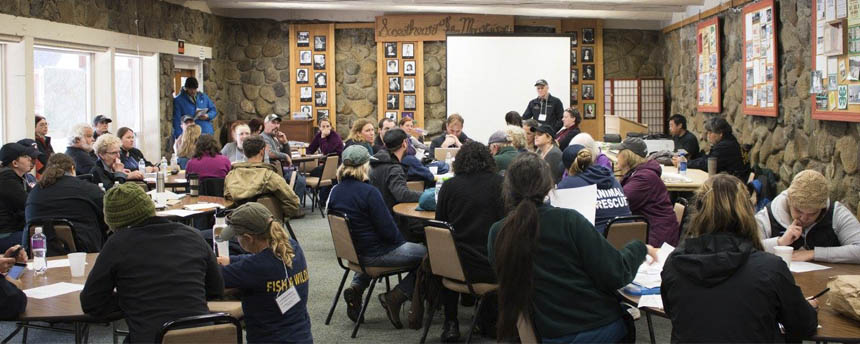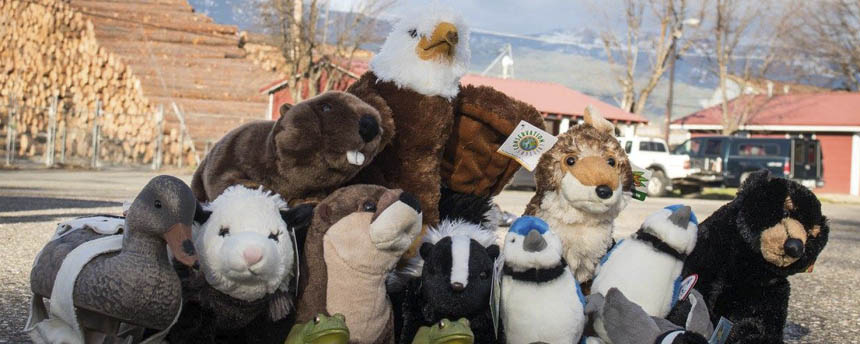When I got word that the Oiled Wildlife Care Network (OWCN) would be hosting an oil spill drill in the Feather River Canyon outside Quincy, California, I immediately asked the team if I could come along for the ride. As the communications lead for the UC Davis One Health Institute, my efforts are spread across many programs and projects that work at the interface of animals, people and the environment. Only occasionally do I get to immerse myself into one program for days at a time. The drill in Quincy was a chance to get a glimpse of the seriousness of a spill without the chaos and stakes of an actual disaster.
Quincy is a hundred miles inland, which was the main point: The risk of a spill is no longer just a coastal concern now that increased inland drilling and fracking in the United States has resulted in more oil moving across the continent by train and pipeline.
So it follows that, now more than ever, oil spill response involves leaders across many industries, from the wildlife experts at the OWCN to the California Department of Fish and Wildlife Office of Spill Prevention and Response, which is tasked with ensuring a clean and healthy environment. Oil industry representatives who represent the responsible party are also heavily involved in spill response. It’s a complex and collaborative effort that requires preparation across disciplines.
At the scene of the spill
The OWCN team happily set aside a seat in their van and looped me into the operation. We pulled into Quincy around noon and ate some packed lunches that had been ordered prior to our arrival. That might seem like a subtle detail in this blog post, but it’s very much part of the larger equation: In the event of a spill, the dozens of folks arriving to respond would need to be fed. That’s not supplemental to the larger operation; it’s essential. An OWCN drill has people dedicated to such logistics.
The next four hours involved the construction of a tent city at the Plumas County Fairgrounds in Quincy, which is where the bulk of the drill was hosted. In coastal spills, much of the oiled animal intake and cleaning would happen at designated facilities within the network, but that’s not the case inland. There are far fewer facilities because the threat of inland oil spills only began to skyrocket in the last few years, prompting an expansion of the OWCN’s attention.
Because there aren’t fully functional, pre-established oiled wildlife facilities scattered across the center of California, the OWCN must be ready to rapidly erect its own upon arrival. So that’s the first thing we did in Quincy after we downed our sandwiches. Large metal cases were rolled out of trailers and four giant heavy-duty tents were unpacked and snapped together.
We finished as it started to get dark, then grabbed dinner and headed back to the hotel for some sleep, as the next day was going to be an early and busy day.
Everyone has a job

OWCN Director Mike Ziccardi kept the circumstances of the “spill” a secret up until the moment it began the following morning, at which point he took the stage as puppet master, a role he seemed to deviously enjoy. Everyone had a job, from the people washing the animals (stuffed ones for the purpose of the drill) to drivers transporting them from the derailment site to the fairgrounds. Not only would the team, with its various roles assigned, act upon the initial release of information from Mike, but they would have to react on the fly to animals being “captured” in the field as well as curveballs (called “injects”) being introduced throughout the day as well.
Communications is a massive part of an oil spill, because not only can you count on news media to descend upon the site when a spill happens, but also unsanctioned responders with good intentions are inclined to get involved, many without proper training like how to stay a safe distance from any spilled substances. Exposure to oil is dangerous for animals and people alike, so one of my injects was to draft a blog post laying out the dangers and explaining how people could proactively help without getting in harm’s way.

I haven’t mentioned yet that it poured rain for much of the drill, which added another layer of unscripted challenges. It dumped so hard at one point that I packed away my Canon for a few hours and stuck with a waterproof GoPro for photos. That’s an inject Mike Ziccardi can’t take credit for. Or can he?
Amazing efforts to mobilize and respond
I found the whole experience to be incredibly impressive. The OWCN breaks its mission into four “Rs,” one of which is Readiness. (The others are Response, Research and Reaching Out). Massive oil spills that affect wildlife don’t happen daily in California, so it’s not like our team is scrambling around the state chasing spills in a constant tizzy. But spills do happen frequently, and in many cases the effects are massive and require many months of devoted attention.
Oil spill readiness and response requires quickness and coordination, which is only achieved through intensive planning and practice. Drills offer the opportunity to test out the planning and to practice a response.
As a first-time participant in a drill, I was amazed watching as more than 80 people suspended reality for two days to mobilize and respond to a disaster that wasn’t actually happening. We’ll all be better for it when a disaster actually does happen.
This post is adapted from the original story, published on the Oiled Wildlife Care Network blog. Justin Cox is content marketing manager for the UC Davis One Health Institute and the Karen C. Drayer Wildlife Health Center.